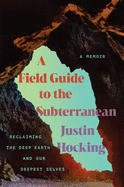
Part haunting memoir and part insightful history, A Field Guide to the Subterranean: Reclaiming the Deep Earth and Our Deepest Selves by Justin Hocking (The Great Floodgates of the Wonderworld) demonstrates the inextricability of personal histories from events and movements that leave deep traces on the cultural and political landscapes of the 21st century. With deeply affective prose, Hocking digs into significant moments of his personal past, interspersing them with exposition of and ruminations about larger factors that played a role in his development and that of many other boys of his generation.
The book's three parts--"Subterranean," "Heights," and "Equatorial"--signal the trajectory Hocking took in his personal life: from the depths of trauma stemming from repeated instances of sexual abuse in his childhood, to the peak of confidence when he discovered the men's movement and pursued an identity as a truly "hard" man, and finally to an equilibrium, neither high nor low but balanced and healthy. Hocking's memories, recounted in short bursts without smooth transitions to passages about history, psychology, social movements, literary concepts, and more, capture the often-fractured experience of finding oneself in a world that bombards young people with all kinds of messages and destroys as much as it creates. For example, Hocking recounts the time when one of his teenage charges went missing on a wilderness trip in a disjointed, nonlinear narrative that's frequently interrupted by earlier memories and in-depth analyses of social phenomena. Though by no means free of fracturing, the book's conclusion offers a calmer interaction with the unevenness of life. --Dainy Bernstein, freelance reviewer

